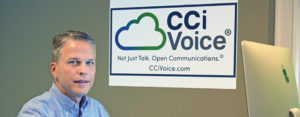The past three months have been tumultuous for Redding-based CCI Voice, a provider of full-service phone systems and hosted business VoIP services. In July, the 27-year-old company changed its name from LeBlanc Communications to CCi Voice. In September, it acquired Long Island-based Tele-Verse Communications Inc., expanding its service markets and workforce.

In this edition of Suite Talk, Business Journal Senior Enterprise Editor Phil Hall speaks with Michael LeBlanc, president and CEO of CCi Voice, on his company”™s new brand and focus.
Why did you decide to drop the LeBlanc Communications name?
“The bottom line is that I didn”™t think my name as the company name was necessarily scalable. I”™m a nice guy, but what special qualities to do I have as a name?
“We were originally going to use Cumulus Communications. That”™s actually our new company”™s name, Cumulus Communications Inc., but we found that people couldn”™t spell Cumulus and not everyone knew that it was a cloud, which is surprising to me. And so just like IBM was International Business Machines for many years, we just became CCi because we cut to the chase with our initials instead of waiting a long time.”
What makes CCi Voice different from its competition?
“Our quality is extraordinary. We electronically monitor every customer”™s phone calls, so if there”™s ever a problem our back-end servers are watching for voice quality. We are the only carrier we”™ve ever heard of that would call a customer and say you”™ve had poor quality phone calls for the last half-hour because we”™ve noticed five or six calls that were poor quality.
“We also electronically monitor the internet quality, so we have a system that checks every customer constantly, 24/7/365. We have beautiful green and red graphs that show the quality of their internet connection ”” and if there”™s a problem, we”™re able to tell them that. I believe that is unique.”
Internet quality ranges from fantastic to dismal. There are certain carriers who will not be mentioned by name who have become infamous for both the very poor quality of their transmissions and even worse customer service. As a relatively small company, how do you maintain quality customer service?
“We are wired for service. We”™ve had people come and go that didn”™t fit the mold. And our people ”” we are now 25 strong ”” are just made for that.
“If we”™re at a birthday party for one of our kids during a Saturday and we find out one of our customers is down because our systems alert us, one of us is going to step aside and say, ”˜Listen, honey, take a minute and please take care of the party ”” I”™ll be right back.”™ And we take care of that customer because we are on call 24/7.
“We have to ”” that”™s what the phone business is. You can”™t just go on vacation and forget about everything. And our families understand that”™s the important thing. You don”™t get into this field of service unless you are wired for that and your families all expect that.”
What is your company”™s footprint?
“We cover all of Connecticut, end to end, and we cover Massachusetts ”” one of our larger customers is Cumberland Farms. We have large customers in Rhode Island and, of course, a ton of them on Long Island especially with the new acquisition. We do Manhattan, northern New Jersey and an up through Dutchess County and southern New York.”
Why did decide to acquire Tele-Verse Communications?
“The wonderful thing about that particular company is they have 750 customers ”” we have around 400. And of those 750 customers, exactly one of them had hosted phone service. And that means all the rest had a box in the closet for their PBX.
How did the Covid-19 pandemic impact your operations? Did you have residential clients prior to this crisis?
“We don”™t have any residential clients ”” we are strictly commercial, usually multisite companies. But now with the home workers, I guess they”™re all multisite.
“One example is a paper company that”™s out of New York City that has 150 users in Manhattan on Park Avenue, and then they have five offices around the country. So, there”™s 350 total users, but they”™re spread around the country in Florida, Texas, California, etc. That”™s common for us.”
You mentioned the home workers ”” the last few months must have been very busy for you.
“We track our call volume, support calls, etc., and in a typical month it was about 100 calls a day. March was 300 calls a day ”” we were jamming. We did keep up but we had to work long hours because everyone was saying, ”˜I have to go home, I have to go home.”™
“The beautiful thing is that their phone system was already designed for that ”” they simply had to take their phone, unplug it and go home and plug it in. But they needed a power adapter because our phones use the ethernet cable to get their electricity. But that means an ethernet switch has to be designed for that ”” a lot of them didn”™t have that. So, we get them a little power adapter plug-in set and that took time to get to all that setup.
“That was March. And then in June, we got busy again putting people back in their offices because they wanted to move back. And now they all use their cellphone apps. They have a mobile phone app and we have a desktop app, both Mac and PC, and that becomes your telephone. It”™s really smooth now and much easier than years ago.”
What are the ultimate plans for the company? What are you looking forward to in 2021?
“We”™re actually in an acquisition mode. I started talking to the company in Long Island in October and November and we were ready to go in March, but then Covid happened. In the next five years, there are at least three to five more companies I plan to acquire. We”™ll keep growing.”
Is this going to be strictly in the Northeast or are you looking for a nationwide acquisition spree?
“That”™s a lot for me to think about right now. We have really good people on our team ”” I have two vice presidents, one of operations, one of marketing communications that have taken a lot of pressure off of me, and I”™ll need more of those sets of people as we grow. For now, I could visualize having another company or two in Connecticut, maybe a Boston company, maybe a New Jersey company. We”™re not really sure yet. But that”™s the hope to grow that way.”





















